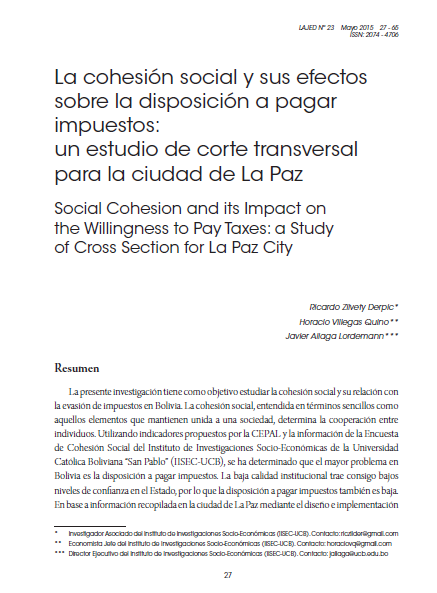The social cohesion and its Impact on the Willingness to Pay Taxes: a Study of Cross Section for La Paz City
DOI:
https://doi.org/10.35319/lajed.20152375Keywords:
Social choice, imperfect information, principal-agent, tax compliance, tax evasion, Constitution, Law and Economics, social cohesion, ethics, moral, social valuesAbstract
This investigation has the objective of study the social cohesion and its relationship with tax evasion in Bolivia. Social cohesion, understood in simple terms as all the elements that maintain a society together, determines the cooperation between individuals. Using indicators proposed by ECLAC and data from the Survey of Social Cohesion Research Institute of Socio-Economics from the Institute of Social and Economic Research at the Universidad Católica Boliviana “San Pablo” (IISEC-UCB) it has been determined that the biggest problem in Bolivia is the willingness to pay taxes. The low institutional quality brings low levels of trust in the state, so the willingness to pay taxes is also low. Based on information gathered in the city of La Paz through the design and implementation of an opinion poll in 2014, it has been determined that the probability of paying taxes increases when social cohesion is higher, ceteris paribus. This presents evidence that it is important not only focus on the control mechanisms of tax evasion, but in the attitudes of people.
Downloads
References
Allingham, M., y Sandmo, A. (1972). “Income Tax Evasion: A Theoretical Analysis”. Journal of Public Economics, (1) 323-338.
Ander-Egg, E. (1995). Técnicas de investigación social, vigésima cuarta ed., Argentina: LUMEN.
Andreoni, J., Erard, B., y Feinstein, J. (1998). “Tax Compliance”. Journal of Economic Literature, 36 (2), 818-860.
Beauvais, C., y Jenson, J. (2002). “Social Cohesion: Updating the State of Research”. CPRN Discussion Paper Nº F|22). Ottawa, Canadá.
Bernard, P. (1999). “Social Cohesion. A Critique”. CPRN Discussion Paper, Nº F|09). Ottawa, Canadá.
Cameron, A. C., y Trivedi, P. K. (2005). Microeconometrics. Methods and Applications. Nueva York, Estados Unidos: Cambridge University Press.
CEPAL y EUROsociAL (2007). Un sistema de indicadores para el seguimiento de la cohesión social en América Latina. Santiago de Chile: Naciones Unidas.
CEPAL y SEGIB (2007). Cohesión social. Inclusión y sentido de pertenencia en América Latina y el Caribe. Santiago de Chile: Naciones Unidas.
Chan, J., To, H.P. y Chan, E. (2006). “Reconsidering Social Cohesion: Developing a Definition and Analytical Framework for Empirical Research”. Social Indicators Research, 75 (2), 273- 302, enero.
Concilio de Europa. (2004). A new strategy for Social Cohesion.
---------- (2005). Concerted development of social cohesion indicators. Methodological guide. Paris, Francia: Council of Europe Publishing.
Ferroni, M., Mateo, M. y Payne, M. (2007). Development Under Conditions of Inequality and Distrust: An Exploration of the Role Of Social Capital and Social Cohesion in Latin America. Banco Interamericano de Desarrollo, Departamento de Desarrollo Sostenible.
Genuzio, T. (2014). Impactos de las reformas recientes de política fiscal sobre la distribución del ingreso. El caso del Estado Plurinacional de Bolivia. CEPAL, Serie Macroeconomía del Desarrollo, Nº 148). Santiago de Chile: Naciones Unidas.
Greene, W. (2003). Econometric Analysis, quinta ed., Nueva Jersey, Estados Unidos: Prentice Hall.
Jeannotte, S. (2000). Social Cohesion Around the World: An international comparison of definitions and issues. Gatineau, Québec, Canadá: Department of Canadian Heritage.
Jenson, J. (1998). “Mapping Social Cohesion. The State of Canadian Research”. CPRN Discussion Paper, Nº F|03). Ottawa, Canadá.
----------- (2010). “Defining and Measuring Social Cohesion”. Commonwealth Secretariat and United Nations Research Institute for Social Development.
Jupp, J. (2007). “The quest for harmony”. En: J. Jupp, J. Nieuwenhuysen y E. Dawson, Social Cohesion in Australia, 9-20. Nueva York, Estados Unidos: Cambridge University Press.
Mansilla, H. (2008). “Una visión crítica en torno a la cultura política de Bolivia”. En: D. Moreno, H. Mansilla, V. Schwarz, E. Córdova y G. Vargas, Cultura política en tiempos de cambio. Institucionalidad, conflicto y región en Bolivia, 13-46). Cochabamba, Bolivia: Ciudadanía, comunidad de estudios sociales y acción pública.
Markus, A. (2013). “Mapping Social Cohesion”. fte 2013 Scanlon Foundations Surveys. Monash University.
Markus, A. y Dharmalingam, A. (2007). “Mapping Social Cohesion”. The 2007 Scanlon Foundations Surveys. Monash University.
Márquez, R. (2010). “Revisión crítica del enfoque de cohesión social de la CEPAL y desafíos para su operacionalización”. En: CEPAL, Cohesión social en América Latina. Una revisión de conceptos, marcos de referencia e indicadores, 17-39. Santiago de Chile: Naciones Unidas.
Martínez, P., Castillo, A. M. y Rastrollo, M. Á. (2009). “Los enfoques de análisis de la evasión fiscal. Una revisión actual de la investigación”. Cuadernos de Ciencias Económicas y Empresariale, Nº 35, Universidad de Málaga.
Maxwell, J. (1996). “Social Dimensions of Economic Growth”. The Eric John Hanson Memorial Lecture Series. vol. 8, 1-33. Ottawa: University of Alberta.
McGee, R. W. (2012). “Four Views on the Ethics of Tax Evasion”. En: R. W. McGee (ed.), The Ethics of Tax Evasion. Perspectives in Theory and Practice, 3-34. Nueva York, Estados Unidos: Springer.
Monterrey, J. (2013). Sistemas de protección social en América Latina y el Caribe: Estado Plurinacional de Bolivia. Santiago de Chile: Naciones Unidas.
Nerré, B. (2008). “Tax Culture: A Basic Concept for Tax Politics”. Economic Analysis & Policy, 38 (1), 153-167.
North, D. C. (1990). Institutions, Institutional Change and Economic Performance. New York: Cambridge University Press.
Otálora, C. (2009). Economía fiscal. La Paz: Plural Editores.
Pereira, R. (2010). “Metodologías cuantitativas, operacionalización de la investigación, recolección y análisis de datos”. En: M. Yapu, D. Y. Arnold, A. L. Spedding P. y R. Pereira M., Pautas metodológicas para investigaciones cualitativas y cuantitativas en ciencias sociales y humanas, tercera ed., 199-302). La Paz, Bolivia: Fundación PIEB.
Policy Research Sub-Committee on Social Cohesion. (1997). Social Cohesion Research Workplan. Social Cohesion Network. Ottawa: Policy Research Initiative.
Statistics Canada. (2010). Survey Methods and Practices. Ottawa, Ontario, Canadá: Minister of Industry.






